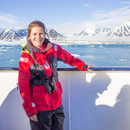Mike Crewe and Brian Small
Welcome to Mike Crewe and Brian Small!

Website & Media Manager
16th March 2021
When and how did your interest in wildlife begin?
Somehow, I seem always to have been interested in wildlife, with my father’s bird books being my favourite picture books as a small child (though he died all too young, before he could be a direct influence on me). I was lucky to have great luminaries of their time such as Bruce Campbell on hand to take me birdwatching and I grew up on the edge of Oxford, with that very green city and its wealth of open spaces in one direction and the open countryside of the Cherwell Valley in the other. Even at primary school, I could bore for my country on the subject of birds – and probably did!
What did you do before working for Naturetrek?
My early career from school was in horticulture, starting in the garden centre at Blenheim Palace – a great place for Hawfinches and Lesser Spotted Woodpeckers at that time! Developing a greater interest in the plants themselves, I went to college to gain horticultural qualifications and spent some 20 years growing nursery stock.
I later got a chance to get involved in environmental work and spent a number of years in various environmental and conservation roles, before starting a fulfilling career as a professional wildlife tour guide.

What other interests do you have outside of wildlife?
None! That might sound rather narrow-minded, but there are so many aspects to wildlife, from understanding behaviour, evolution, taxonomy and identification to trying to make sense of how complete ecosystems fit together and function, that there’s no time for anything else.
Perhaps I should qualify that statement by saying that I do also have all those other ‘normal’ traits of interest in football (even though I come from Oxford!), music (I was the resident DJ at college during my formative dance music phase!) and enjoying a decent pint (the surge in micro-breweries in recent years has been amazing!) – but surely, we all like those!
When and where was your first tour leading assignment for Naturetrek?
I’m a relative newcomer to Naturetrek, having led my first trip for the company to Greece – the wonderful Delphi and Parnassos tour – in 2018. However, my overseas tour leading experience goes all the way back to 1996, while I’ve been leading UK day trips and short breaks for local wildlife groups since 1982 (now I feel old!).
What is your ‘day job’?
Wildlife tour leading has been my full-time career since 1997, with administrative duties between tours giving me a fully rounded knowledge of all aspects of the job. However, I did take a period of six years out while I worked as Programme Director for Cape May Bird Observatory, in New Jersey, USA which was a great opportunity to work in adult education and spread the word about the wonders of migration.


Do you have a favourite bird, mammal or plant?
Always a popular question from tour participants and one that I find impossible to answer easily. There are so many great species out there and I think that often it’s a special encounter with a species that pushes it up the list (and now I’ve just noticed what the next question is!). Being eye to eye with any of the great cats in the wild is always thrilling but humbling; seeing the extraordinary Welwitschia mirabilis in its natural environment in Namibia was the realisation of a childhood dream after seeing one of these strange plants in Oxford Botanic Gardens, and climbing into a sallow bush and sitting side-by-side with a Lanceolated Warbler on its breeding grounds in Siberia have all been very special moments with very special species. Oh, and you really can’t beat a Harlequin Duck, can you?!
What is your most memorable wildlife encounter to date?
Aside from me wandering into this area while answering the last question... so many extraordinary encounters have happened that make wildlife travel so special every time. There’s the magic of albatrosses in their natural environment and any experience that involves the sheer volume of anything, whether it be carpets of flowers stretching to the horizon in the exuberance of a South African spring or the mass migration of Monarch butterflies through Cape May in the autumn, these are all totally amazing encounters.
With a different hat on, there’s also the contribution we can make to science through our travels and which can create some memorable moments. For me, eventually being given the identity of a dragonfly that I photographed in Madagascar and discovering that it was the first male known to science of its species (and still the only one, I believe), certainly stands out as a very special moment.


What current conservation projects most interest you?
Wow, there are so many, and so hard to single any out as they are all valuable and vital to the future for us all. But currently, perhaps I’d have to say the big upswelling in rewilding and landscape-scale restoration programmes in the UK that seemed impossible just a few years ago. Also, I just learned yesterday of a programme in the Balkan countries where young and keen botanists are out in the field, mapping the very rare endemic plants that survive at a tiny handful of sites, while working on creating seedbanks and creating habitat to increase their range. Not only is this helping nature, but it is a project that sees nations coming together across borders in an area only recently torn apart.
What are you reading at the moment?
I’ve been restless with my reading lately and have several books on the go at once (in addition to keeping up with various monthly magazines!). Currently on the go are ‘Travels in China’ by Roy Lancaster (which I’ve had for about 20 years and am only just getting round to), ‘Meadows’ by George Peterken in the British Wildlife Collection series and ‘Heroes’ by Stephen Fry.
Who would you invite to dinner?I’d invite a group of environmental and conservation students fresh out of university. Their dreams, aspirations and optimism for the future is always infectious, inspirational and fun – but I might have Bill Bailey there for balance too!
What new destination would you most like to travel to next?As tour guides, we are in a very privileged position to be able to travel regularly to so many amazing places and our ‘want’ list gradually whittles down over time. Right now, I think that top of my list would be the winter trip to Hokkaido, Japan for the world’s largest owl, the gatherings of wintering cranes and those amazing Steller’s Sea Eagles (actually, maybe Steller should come to dinner too – he’d have some amazing stories to tell!).





 Loading search...
Loading search...